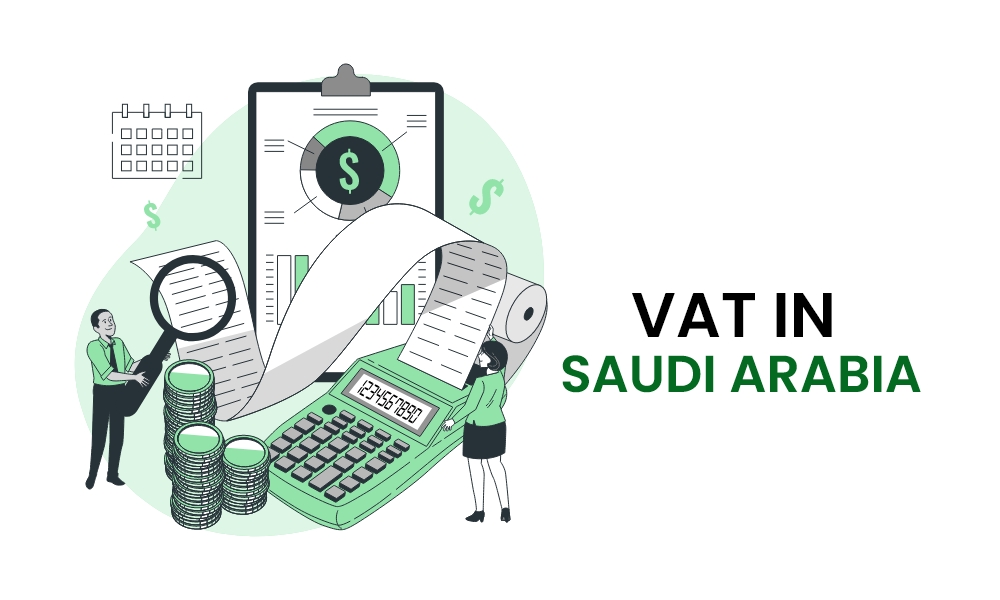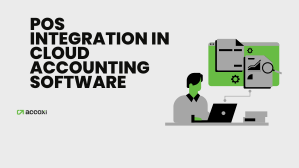VAT in Saudi Arabia
What is VAT (value-added tax) in Saudi Arabia?
The Kingdom of Saudi Arabia (KSA) implemented VAT (Value Added Tax) on January 1, 2018. VAT (Value Added Tax) makes it easier for businesses to monitor their purchases and sales, in addition to their tax obligations. Here we discuss VAT rates, who can register under VAT, who is exempt from VAT registration, taxable and non-taxable supplies under VAT, and VAT returns. Accoxi, is an accounting cloud -software that simplifies accounting transactions.
Saudi Arabia's VAT rate:
Saudi Arabia is the second GCC country to implement VAT. On January 1, 2018, Saudi Arabia charged a Value Added Tax (VAT) at a standard rate of 5%, which applies to all goods and services. The VAT (Value Added Tax) rate is categorized as standard rate and zero rate.
Standard Rate: The ZATCA (Zakat, Tax, and Customs Authority) has revised the standard VAT rate from 5% to 15% from July 1, 2020, onwards. VAT is charged on all goods and supplies.
Zero Rate: Zero rate VAT supplies are supplies of goods and services where VAT is charged at 0% and not exempt from tax. Zero-rate VAT supplies include goods, services, international goods, passenger services, qualifying medicines, medical goods, and qualified investment metals.
Who can register for VAT in Saudi Arabia?
Businesses with an annual turnover of SAR 375,000 or more must register for VAT. The VAT (Value Added Tax Rate) registration process in Saudi Arabia has been classified into three stages.
- Mandatory Registration: A business that resides in Saudi Arabia and where the tax exceeds SAR (Saudi Riyal) 375,000 within 12 months must register for Saudi VAT.
- Voluntary VAT Registration: Saudi Arabia residents who have businesses in the kingdom and have a tax rate more than SAR 187,500 but not more than SAR 375,000 in the coming 12 months or are expected to increase in the next 12 months can register under voluntary VAT registration.
- Exemption from VAT Registration: Business annual supplies that increases mandatory VAT registration but involve zero supplies are exempt from VAT registration.
How to register for VAT in Saudi Arabia
VAT registration is done by the General Authority for Zakat and Tax (GAZT) in Saudi Arabia. To register for VAT in Saudi Arabia, you will need to apply to the GAZT. You must provide the necessary information and attachments required by the authorities.
Steps to register for VAT in Saudi Arabia
To start a business in Saudi Arabia, you must complete the following steps during registration:
- First, you need to register your TIN (Tax Identification Number).
- Then you need to register with GAZT (General Authority of Zakat and Tax) Portal.
- Then select the VAT registration option on the dashboard. To complete the registration process, you must submit all required documents.
Finally, you must declare that the submitted documents are correct.
VAT Returns
Businesses registered for Value Added Tax (VAT) must submit regular VAT returns to the General Authority for Zakat and Tax (GAZT). Input tax credits can be claimed, VAT owed can be calculated, and taxable transactions can be reported using VAT returns.
- Businesses with an annual turnover of more than SAR (Saudi Riyal) 40 million are required to file the mandatory tax return.
Here are some key points about VAT returns in Saudi Arabia:
- Notification Frequency: VAT notifications are usually quarterly in Saudi Arabia. However, GAZT can decide which companies must submit monthly notifications based on their revenue or compliance history.
- Deadline: The VAT return must be submitted and paid within twenty days of the declaration period's end.
- Reporting Rules: Businesses must submit taxable supplies (sales) and tax records (purchases) for each period to their VAT declaration. This includes information such as the VAT amount, the number of customers paying VAT, and the number of suppliers paying VAT.
- Tax liability: VAT liability is the difference between VAT included in the purchase price and VAT accounted for in the sales price. If the VAT paid is more than the VAT included in the purchase, the company must pay the net VAT amount to GAZT.
- Electronic declaration: VAT declarations are submitted electronically through the GAZT portal. Businesses should make sure they have the right information and documents to support their VAT number.
Taxable and Non-Taxable VAT Supplies
Taxable and non-taxable supplies under VAT are as follows:
Taxable supplies:
- Goods: Unless specifically exempt or zero-rated, most goods are subject to VAT at the standard rate of 15% when sold, leased, or transferred.
- Services: Businesses must charge VAT at the standard rate for most services. Consulting, advertising, professional services, maintenance, repairs, transportation, and other services fall into this category.
- Imports: VAT is charged on imported goods at the point of importation, with some exceptions or conditions imposed by specific regulations.
- Real Estate: VAT is required on the sale, lease or rental of commercial property or vacant land.
- Entertainment: Normal VAT rates apply to sporting events, concerts and entertainment venues.
- Catering services and restaurants: Statutory VAT applies to restaurants and catering services
Non-TaxableSupplies or Exempted From VAT
- Financial Services: Banks, insurance companies, and other financial institutions do not pay VAT for their services.
- Healthcare: Hospital services are exempt from VAT, as are medical and healthcare services.
- Education: Educational services provided by schools, universities, and vocational training centers are exempted from VAT.
- Residential rental: VAT is not charged on rentals or rental agreements for residential properties for 5 years.
- Public Transport: State public transport services are not subject to VAT.
- Certain Goods and Services: Under Saudi Arabia's VAT law, certain goods and services are exempt from VAT, such as prepared meals, medical equipment, and some export products.
Bottom Line
The introduction of value-added tax (VAT) in Saudi Arabia has had a major impact on the country's economy. There are certain VAT regulations and changes that can occur from time to time and under some circumstances that businesses should be aware of. Accoxi has Saudi Arabia's VAT rates enabled, making it easier for those intending to set up businesses in the Kingdom of Saudi Arabia.





